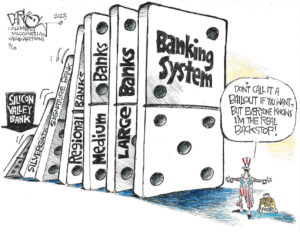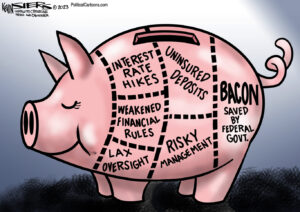Surprise! Paulson Sneaked $150B Bank ‘Windfall’ Into Bailout
Perhaps we should be more surprised than we are by the news that Treasury Secretary Henry Paulson and his DOT crew managed to sneak a handful of sentences into the approved bailout bill that amounted to a $150-billion "quiet windfall" for American banks, as The Washington Post put it.
Perhaps we should be more surprised than we are by the news that Treasury Secretary Henry Paulson and his DOT crew managed to sneak a handful of sentences into the approved bailout bill that amounted to a $150-billion “quiet windfall” for American banks, as The Washington Post put it. Some tax experts are saying that the move not only seems shady, but it may also be illegal.
As Congress and the country were still reeling over the multiple implosions on Wall Street this fall, Paulson attempted to include a clause in his initial bailout proposal that would have made his pursuant actions “non-reviewable” by Congress or “any court of law.” Perhaps now we know why.
Your support matters…Washington Post:
The sweeping change to two decades of tax policy escaped the notice of lawmakers for several days, as they remained consumed with the controversial bailout bill. When they found out, some legislators were furious. Some congressional staff members have privately concluded that the notice was illegal. But they have worried that saying so publicly could unravel several recent bank mergers made possible by the change and send the economy into an even deeper tailspin.
“Did the Treasury Department have the authority to do this? I think almost every tax expert would agree that the answer is no,” said George K. Yin, the former chief of staff of the Joint Committee on Taxation, the nonpartisan congressional authority on taxes. “They basically repealed a 22-year-old law that Congress passed as a backdoor way of providing aid to banks.”
The story of the obscure provision underscores what critics in Congress, academia and the legal profession warn are the dangers of the broad authority being exercised by Treasury Secretary Henry M. Paulson Jr. in addressing the financial crisis. Lawmakers are now looking at whether the new notice was introduced to benefit specific banks, as well as whether it inappropriately accelerated bank takeovers.
The change to Section 382 of the tax code — a provision that limited a kind of tax shelter arising in corporate mergers — came after a two-decade effort by conservative economists and Republican administration officials to eliminate or overhaul the law, which is so little-known that even influential tax experts sometimes draw a blank at its mention. Until the financial meltdown, its opponents thought it would be nearly impossible to revamp the section because this would look like a corporate giveaway, according to lobbyists.
Independent journalism is under threat and overshadowed by heavily funded mainstream media.
You can help level the playing field. Become a member.
Your tax-deductible contribution keeps us digging beneath the headlines to give you thought-provoking, investigative reporting and analysis that unearths what's really happening- without compromise.
Give today to support our courageous, independent journalists.




You need to be a supporter to comment.
There are currently no responses to this article.
Be the first to respond.